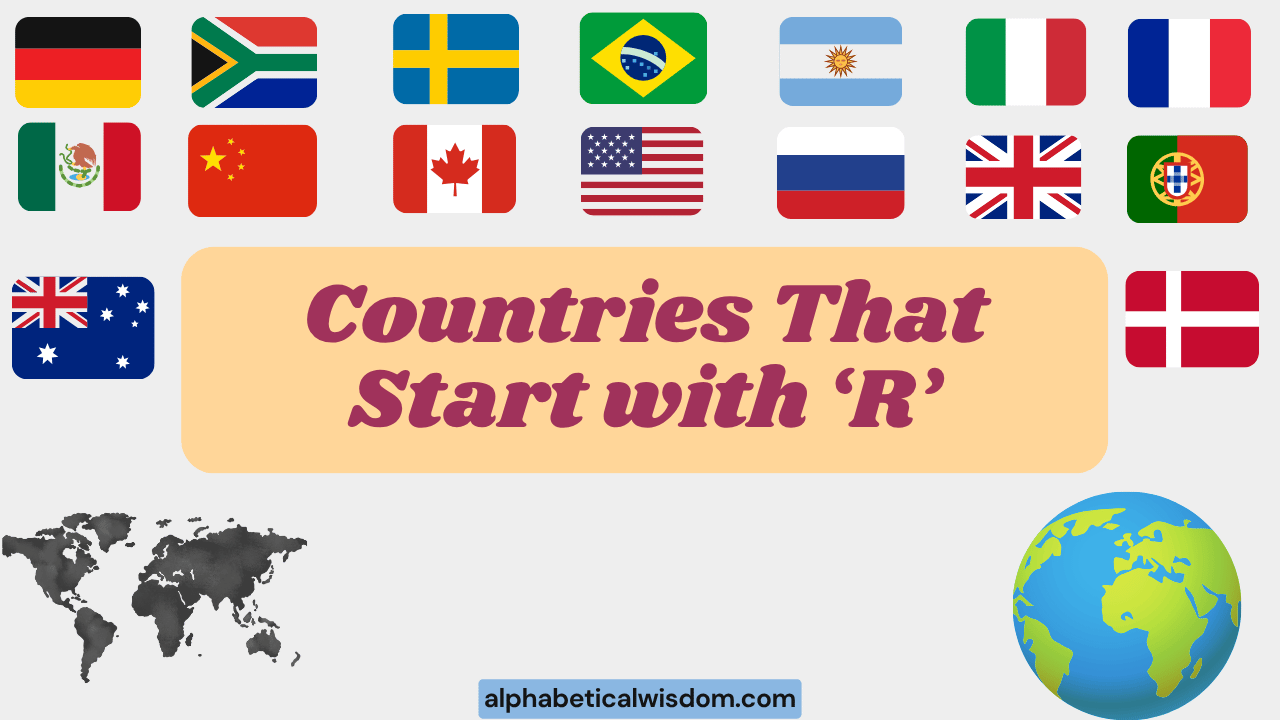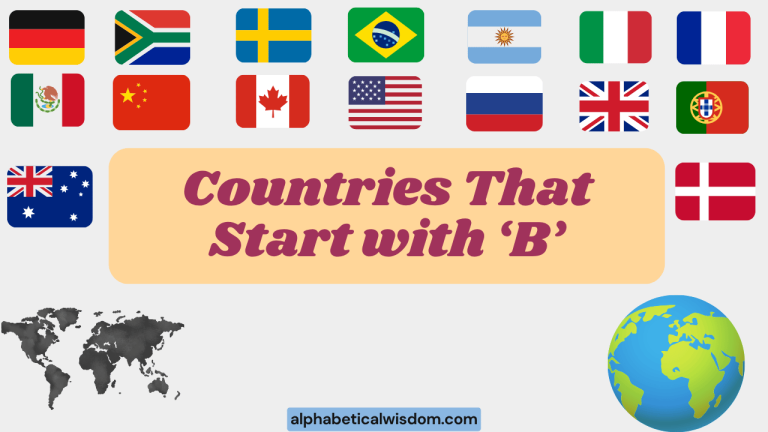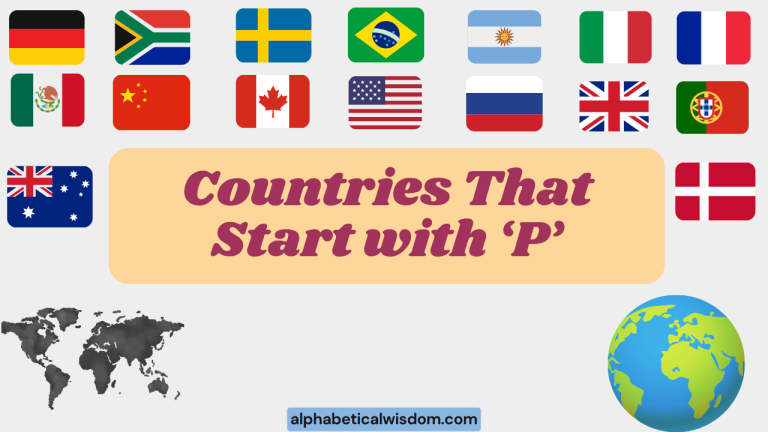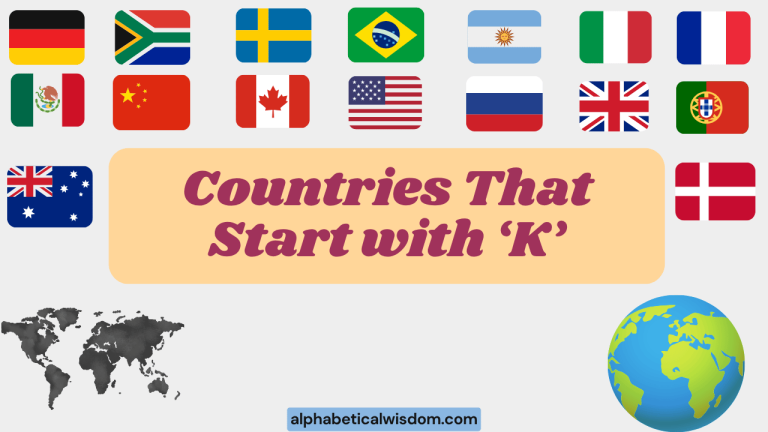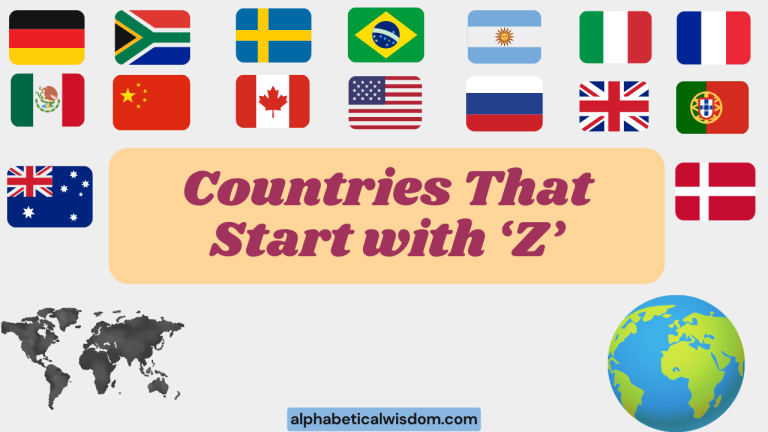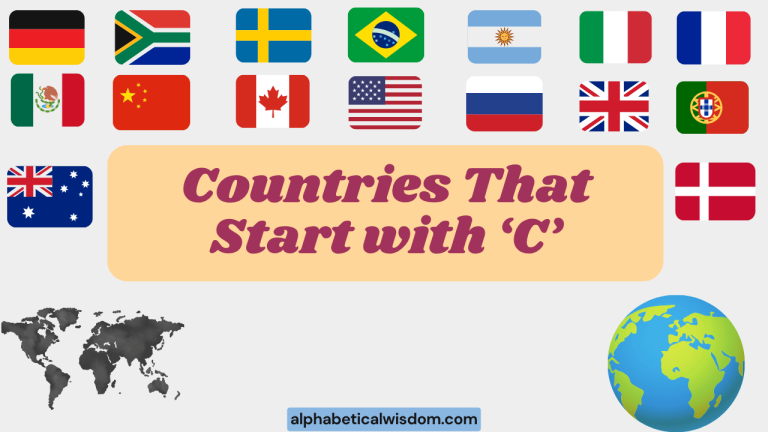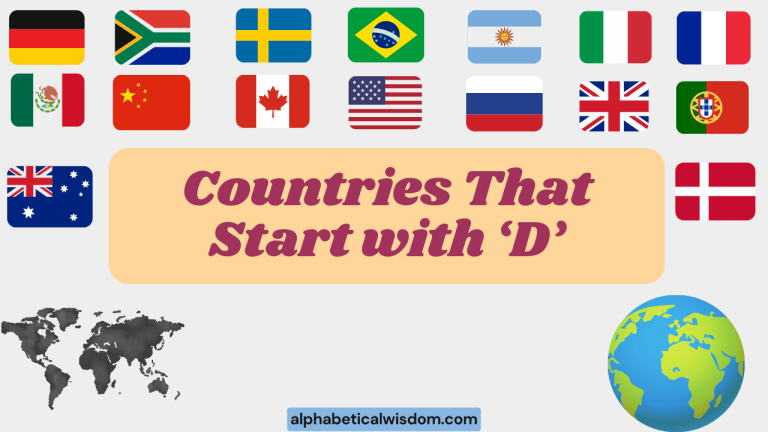Countries Starting with R: A Grammatical Exploration
Understanding the grammar surrounding country names, particularly those starting with specific letters, is crucial for accurate and effective communication. This article focuses on countries that begin with the letter ‘R,’ exploring their grammatical properties, usage rules, and common pitfalls.
Mastering these aspects enhances your ability to write and speak about these countries with confidence and precision. This guide is designed for English language learners of all levels, from beginners seeking foundational knowledge to advanced speakers aiming to refine their understanding and usage.
Table of Contents
- Introduction
- Definition: Countries Starting with ‘R’
- Structural Breakdown
- Types or Categories
- Examples
- Usage Rules
- Common Mistakes
- Practice Exercises
- Advanced Topics
- FAQ
- Conclusion
Definition: Countries Starting with ‘R’
A country is a politically defined geographical area with its own government, population, and sovereignty. When we refer to “countries starting with ‘R’,” we are specifically identifying nations whose official English name begins with the letter ‘R.’ These names function as proper nouns in English grammar and are subject to specific rules regarding capitalization, article usage, and adjective formation.
These country names are crucial elements in various forms of communication, including news reporting, academic writing, and everyday conversation. Understanding their grammatical characteristics allows for clearer and more accurate expression.
In addition, the correct use of these names demonstrates respect for the cultures and identities they represent.
The names of countries are usually singular proper nouns. They are capitalized, and when used in a sentence, they require verbs to agree in number.
Furthermore, each country has a corresponding adjective, often used to describe things originating from or related to that country. For example, the adjective form of Russia is Russian.
Structural Breakdown
The structure of country names starting with ‘R’ is relatively straightforward. They primarily function as singular proper nouns.
However, understanding their structural role within sentences and phrases is vital for grammatical accuracy.
Country names serve as subjects, objects, or complements within a sentence. They can be modified by adjectives and used in conjunction with verbs and prepositions to convey specific meanings.
The correct placement and usage of these names contribute to the overall clarity and coherence of written and spoken English.
Consider the example of “Romania.” In the sentence “Romania is a beautiful country,” ‘Romania’ functions as the subject. In the sentence “I visited Romania last year,” ‘Romania’ functions as the object.
Understanding these roles is key to constructing grammatically sound sentences.
Types or Categories
While all countries starting with ‘R’ share the common characteristic of beginning with the letter ‘R,’ they can be categorized based on various geographical, political, and linguistic factors. These categories are not grammatical in nature, but they provide context for understanding the countries themselves.
Geographical Categories
Countries can be categorized by continent (e.g., Europe, Asia, Africa), region (e.g., Eastern Europe, the Middle East), or geographical features (e.g., landlocked countries, island nations). For instance, Russia spans both Europe and Asia, while Rwanda is located in Africa.
Political Categories
Countries can also be categorized by their political system (e.g., republic, monarchy, democracy), their economic status (e.g., developed, developing), or their membership in international organizations (e.g., the United Nations, the European Union). Russia, for example, is a federation with a semi-presidential republic.
Linguistic Categories
The official language spoken in each country is another way to categorize them. For example, Romanian is the official language of Romania, while Russian is the official language of Russia.
This linguistic diversity highlights the rich tapestry of cultures and languages represented by these countries.
Examples
This section provides extensive examples of countries starting with ‘R’ used in various grammatical contexts. These examples illustrate the different ways these names function as subjects, objects, adjectives, and more.
General Examples
The following table lists countries that start with the letter ‘R’.
| Country |
|---|
| Romania |
| Russia |
| Rwanda |
Examples in Sentences
The following table provides examples of how these country names are used in complete sentences, showcasing their role as subjects, objects, and other grammatical elements.
| Sentence | Grammatical Role |
|---|---|
| Romania is known for its beautiful castles. | Subject |
| I plan to visit Russia next summer. | Object |
| The president of Rwanda gave a speech yesterday. | Object of Preposition |
| She is from Romania. | Object of Preposition |
| The climate in Russia can be very harsh. | Object of Preposition |
| Rwanda has made significant progress in healthcare. | Subject |
Examples with Adjectives
Each country has a corresponding adjective used to describe things originating from that country. The following table illustrates the adjective forms and their usage.
| Country | Adjective | Example Sentence |
|---|---|---|
| Romania | Romanian | She speaks Romanian fluently. |
| Russia | Russian | He enjoys reading Russian literature. |
| Rwanda | Rwandan | The Rwandan culture is rich and diverse. |
| Romania | Romanian | I love the taste of Romanian wine. |
| Russia | Russian | Russian winters are very cold. |
| Rwanda | Rwandan | The Rwandan government is working to improve education. |
Examples with Verbs
The following table demonstrates how country names are used with different verbs, ensuring subject-verb agreement.
| Sentence | Explanation |
|---|---|
| Romania is a member of the European Union. | Singular verb ‘is’ agrees with the singular noun ‘Romania’. |
| Russia has a rich history. | Singular verb ‘has’ agrees with the singular noun ‘Russia’. |
| Rwanda is known as the land of a thousand hills. | Singular verb ‘is’ agrees with the singular noun ‘Rwanda’. |
| Romania borders several countries. | Singular verb ‘borders’ agrees with the singular noun ‘Romania’. |
| Russia exports a lot of natural gas. | Singular verb ‘exports’ agrees with the singular noun ‘Russia’. |
| Rwanda imports most of its manufactured goods. | Singular verb ‘imports’ agrees with the singular noun ‘Rwanda’. |
Examples with Prepositions
This table provides examples of how prepositions are used with country names to indicate location, direction, or other relationships.
| Sentence | Preposition |
|---|---|
| She traveled to Romania. | to |
| He lives in Russia. | in |
| The conference was held in Rwanda. | in |
| She is flying from Romania. | from |
| The package was sent via Russia. | via |
| The road goes through Rwanda. | through |
Usage Rules
There are specific rules governing the proper use of country names starting with ‘R’ in English grammar. These rules ensure clarity, accuracy, and grammatical correctness.
Capitalization: Country names are proper nouns and must always be capitalized. For example, write “Romania,” not “romania.”
Article Usage: Generally, country names do not require articles (e.g., “the”). However, there are exceptions, such as when the country name includes words like “Republic” or “Kingdom” (e.g., the Republic of Ireland). None of the countries starting with ‘R’ require the article ‘the’.
Subject-Verb Agreement: Country names are typically singular and require singular verbs. For example, “Romania is a beautiful country,” not “Romania are a beautiful country.”
Adjective Formation: Each country has a corresponding adjective form. Use this adjective to describe things related to that country. For example, “Russian literature” not “Russia literature.”
Preposition Usage: Use the correct preposition to indicate location, direction, or other relationships. Common prepositions include “in,” “to,” “from,” and “of.” For example, “He lives in Russia,” not “He lives at Russia.”
Common Mistakes
Even experienced English speakers sometimes make mistakes when using country names. This section highlights common errors and provides corrections.
| Incorrect | Correct | Explanation |
|---|---|---|
| romania is a beautiful country. | Romania is a beautiful country. | Country names must be capitalized. |
| I am going to the Russia. | I am going to Russia. | Country names generally do not require articles. |
| Russia are a big country. | Russia is a big country. | Use a singular verb with singular country names. |
| I love Russia food. | I love Russian food. | Use the correct adjective form. |
| She lives at Romania. | She lives in Romania. | Use the correct preposition. |
| The capital of Rwanda are Kigali. | The capital of Rwanda is Kigali. | Use a singular verb with a singular country name. |
Practice Exercises
These exercises will help you practice using country names starting with ‘R’ correctly. Each exercise focuses on a different aspect of grammar.
Exercise 1: Fill in the Blanks
Fill in the blanks with the correct country name (Romania, Russia, or Rwanda).
| Question | Answer |
|---|---|
| The capital of ______ is Bucharest. | Romania |
| ______ is the largest country in the world. | Russia |
| ______ is known as the “Land of a Thousand Hills.” | Rwanda |
| ______ joined the European Union in 2007. | Romania |
| ______ has a long border with China. | Russia |
| Kigali is the largest city in ______. | Rwanda |
| Transylvania is a region in ______. | Romania |
| Moscow is the capital of ______. | Russia |
| Coffee is a major export of ______. | Rwanda |
| ______ is located in Eastern Europe. | Romania |
Exercise 2: Correct the Errors
Identify and correct the errors in the following sentences.
| Incorrect Sentence | Correct Sentence |
|---|---|
| romania is a beautiful place. | Romania is a beautiful place. |
| I want to visit the russia. | I want to visit Russia. |
| Russia are famous for its vodka. | Russia is famous for its vodka. |
| I love rwandan coffee. | I love Rwandan coffee. |
| She is from the Romania. | She is from Romania. |
| The capital of rwanda are Kigali. | The capital of Rwanda is Kigali. |
| He speaks romania. | He speaks Romanian. |
| I am going to the Russia next year. | I am going to Russia next year. |
| Russian winters is very cold. | Russian winters are very cold. |
| She lives at Rwanda. | She lives in Rwanda. |
Exercise 3: Sentence Construction
Construct sentences using the given words and phrases, incorporating the country names Romania, Russia, and Rwanda.
| Words/Phrases | Example Sentence |
|---|---|
| Romania, known, castles | Romania is known for its beautiful castles. |
| Russia, largest, country | Russia is the largest country in the world. |
| Rwanda, coffee, exports | Rwanda exports high-quality coffee. |
| Romania, member, EU | Romania is a member of the European Union. |
| Russia, border, China | Russia shares a border with China. |
| Rwanda, capital, Kigali | The capital of Rwanda is Kigali. |
| Romania, language, Romanian | The official language of Romania is Romanian. |
| Russia, history, rich | Russia has a rich and complex history. |
| Rwanda, progress, development | Rwanda has made significant progress in economic development. |
| Romania, travel, beautiful | I would like to travel to beautiful Romania. |
Advanced Topics
For advanced learners, there are more complex aspects to consider when discussing countries starting with ‘R’. These include historical context, political nuances, and cultural references.
Historical Context: Understanding the historical background of each country provides a deeper appreciation for its current state and its role in global affairs. For example, Russia’s history as the Soviet Union influences its present-day political landscape. Romania’s history is marked by various periods of foreign influence, including Ottoman and Austro-Hungarian rule, shaping its cultural identity. Rwanda’s history is deeply affected by the 1994 genocide, a pivotal event impacting its social and political structures.
Political Nuances: Each country has its own political system, challenges, and international relations. Understanding these nuances is crucial for accurate and informed discussions. For example, Russia’s relationship with NATO is a complex and often contentious issue. Romania’s integration into the European Union presents both opportunities and challenges. Rwanda’s efforts toward reconciliation and development are significant political undertakings.
Cultural References: Literature, art, music, and other cultural forms offer insights into the unique identities of these countries. Familiarity with these references enriches your understanding and communication. For example, Russian literature, with authors like Tolstoy and Dostoevsky, is world-renowned. Romanian folklore and traditions are rich and diverse. Rwandan music and dance reflect the country’s cultural heritage.
FAQ
This section addresses frequently asked questions about using country names starting with ‘R’.
- Why is it important to use correct grammar when talking about countries?
Using correct grammar shows respect for the country and its people, and ensures clear and effective communication. Grammatical errors can lead to misunderstandings and misinterpretations, which can be particularly problematic in international contexts. Correct grammar also enhances your credibility and professionalism.
- Do all country names follow the same grammatical rules?
No, while many rules are generally applicable, there are exceptions. Some country names require articles (e.g., the United States), while others do not. Some country names are plural (e.g., the Netherlands), while others are singular. It’s important to learn the specific rules for each country name.
- How do I find the correct adjective form for a country name?
You can usually find the adjective form in a dictionary or online. Simply search for the country name followed by “adjective.” For example, searching for “Romania adjective” will give you “Romanian.”
- Are there any regional variations in the pronunciation of country names?
Yes, pronunciation can vary depending on the speaker’s accent and regional dialect. However, it’s generally best to use the standard pronunciation to ensure clarity and avoid confusion. Online dictionaries often provide audio pronunciations to help you learn the correct way to say a country name.
- What should I do if I’m not sure about the correct grammar for a particular country name?
Consult a dictionary, grammar guide, or online resource. If you’re writing something formal, it’s always a good idea to double-check your grammar to ensure accuracy. You can also ask a native English speaker for help.
- How do I know which preposition to use with a country name?
The choice of preposition depends on the context. “In” is generally used to indicate location (e.g., “He lives in Russia”). “To” is used to indicate direction (e.g., “She traveled to Romania”). “From” is used to indicate origin (e.g., “He is from Rwanda”). “Of” is used to indicate possession or relationship (e.g., “The capital of Russia”).
- Are there any offensive or outdated terms I should avoid when referring to these countries?
It’s essential to use respectful and current terminology. Avoid using outdated or colonial-era names or terms that may be offensive to the people of these countries. Always refer to the official name of the country and be mindful of cultural sensitivities.
- How can I improve my knowledge of countries and their cultures?
Read books, articles, and news reports about these countries. Watch documentaries and films. Listen to music and learn about the art and literature of these cultures. You can also connect with people from these countries and learn from their experiences.
Conclusion
Mastering the grammar of country names starting with ‘R’ is essential for effective communication and cultural sensitivity. By understanding the rules governing capitalization, article usage, subject-verb agreement, adjective formation, and preposition usage, you can avoid common mistakes and express yourself with confidence and accuracy.
Remember to consult reliable resources and practice regularly to reinforce your learning.
This article has provided a comprehensive overview of the grammatical aspects of countries starting with ‘R’, along with practical examples and exercises. Continue to expand your knowledge by exploring the history, culture, and political landscape of these countries.
By doing so, you will not only improve your grammar but also gain a deeper appreciation for the diversity of the world.
Keep practicing, and you’ll become more proficient in using country names correctly in your writing and speaking. Remember, language learning is a continuous process, and every step you take brings you closer to fluency and accuracy.
